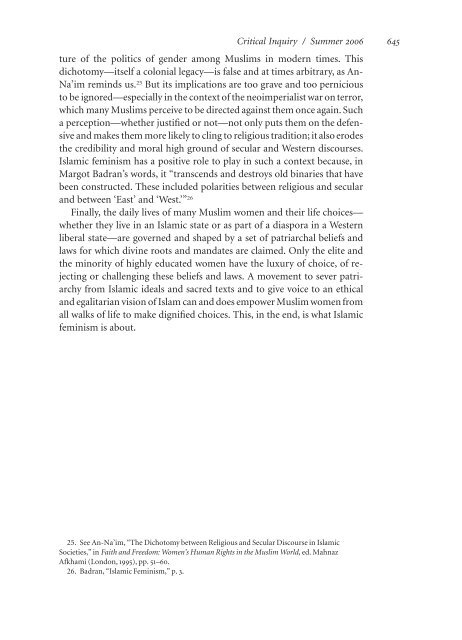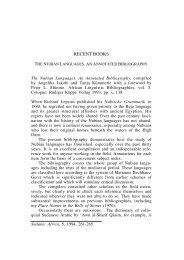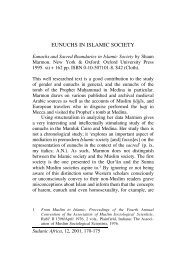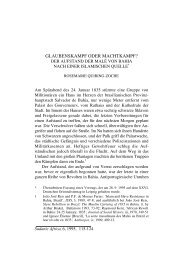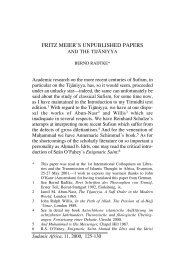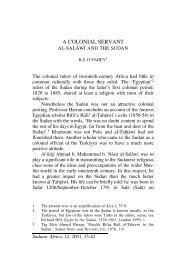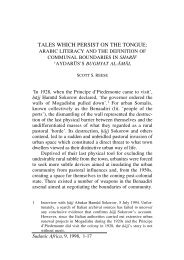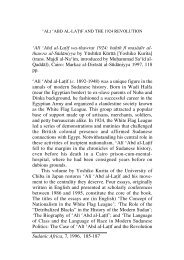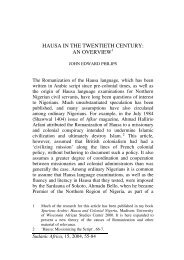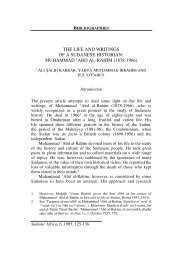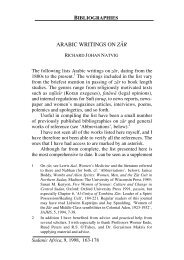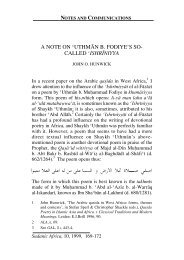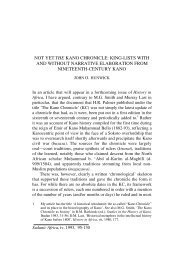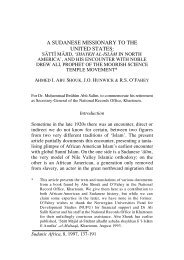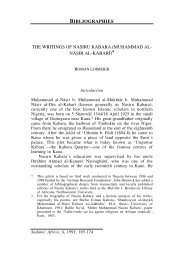644 Ziba Mir-Hosseini / <strong>Between</strong> <strong>Islamic</strong> <strong>Law</strong> <strong>and</strong> Feminismthe sharia <strong>and</strong> the legitimacy of the views of those who until now have spokenin the name of Islam. Such a challenge has been made possible, eveninevitable, by the Islamists’ call <strong>for</strong> a return to sharia <strong>and</strong> attempts toimposeanachronistic jurisprudential constructions of gender relations. This callhas placed <strong>Islamic</strong> feminism in a unique position to bring about a muchneededparadigm shift in <strong>Islamic</strong> law. It exposes the inequalities embeddedin current interpretations of sharia—fiqh—as constructions by male juristsrather than manifestations of the divine will. This exposure can have importantepistemological <strong>and</strong> political consequences: epistemological, because,if taken to its logical conclusion, one can argue that some rules thatuntil now have been claimed as <strong>Islamic</strong> <strong>and</strong> part of the sharia are in factonly the views <strong>and</strong> perceptions of some <strong>Muslim</strong>s <strong>and</strong> are social practices<strong>and</strong> norms that are neither sacred nor immutable but human <strong>and</strong> changing;political, because it can both free <strong>Muslim</strong>s from taking a defensive position<strong>and</strong> enable them to go beyond old fiqh dogmas in search of new questions<strong>and</strong> new answers.Can a feminist discourse that takes its legitimacy from Islam’s sacredtexts <strong>and</strong> that must operate within a closed legal system like fiqh, with littlesupport from the power base in that tradition, break that closed systemapart? In other words, can its advocates nurture a gender discourse thatmeets women’s aspirations <strong>for</strong> equality? My answer to this question is aqualified yes, <strong>for</strong> three reasons.First, given the current realities of the <strong>Muslim</strong> world, in which the Islamistshave the upper h<strong>and</strong> in defining the terms of reference of political<strong>and</strong> gender discourses, I would maintain that only those who are preparedto engage with Islam’s sacred texts <strong>and</strong> its legal tradition can bring changefrom within. Otherwise, <strong>Muslim</strong> women’s quest <strong>for</strong> equality will remain ahostage to the <strong>for</strong>tunes of various political <strong>for</strong>ces <strong>and</strong> tendencies, as was thecase in the twentieth century. In my view, secular feminism in the <strong>Muslim</strong>world fulfilled its historical role by paving the way <strong>for</strong> women’s entry intopolitics <strong>and</strong> society in the early twentieth century. But since the rise of politicalIslam in the second part of the century, the battle between tradition<strong>and</strong> modernity in which <strong>Muslim</strong> women are still caught must be conductedin a religious language <strong>and</strong> framework, where jurisprudentialconstructionsof gender can be reexamined <strong>and</strong> the patriarchal m<strong>and</strong>ates of fiqh can bechallenged. The legal gains <strong>and</strong> losses of women in Iran, <strong>and</strong> now in Afghanistan<strong>and</strong> Iraq, testify to the fact that there can be no sustainable gainsunless patriarchal notions of family <strong>and</strong> gender relations are debated, challenged,<strong>and</strong> redressed within an <strong>Islamic</strong> framework.Second, the emerging feminist voices in Islam have the potential to overcomethe dichotomy between “Islam” <strong>and</strong> feminism, which has been a fea-
Critical Inquiry / Summer 2006 645ture of the politics of gender among <strong>Muslim</strong>s in modern times. Thisdichotomy—itself a colonial legacy—is false <strong>and</strong> at times arbitrary, as An-Na’im reminds us. 25 But its implications are too grave <strong>and</strong> too perniciousto be ignored—especially in the context of the neoimperialist war on terror,which many <strong>Muslim</strong>s perceive to be directed against them once again. Sucha perception—whether justified or not—not only puts them on the defensive<strong>and</strong> makes them more likely to cling to religious tradition; it also erodesthe credibility <strong>and</strong> moral high ground of secular <strong>and</strong> Western discourses.<strong>Islamic</strong> feminism has a positive role to play in such a context because, inMargot Badran’s words, it “transcends <strong>and</strong> destroys old binaries that havebeen constructed. These included polarities between religious <strong>and</strong> secular<strong>and</strong> between ‘East’ <strong>and</strong> ‘West.’” 26Finally, the daily lives of many <strong>Muslim</strong> women <strong>and</strong> their life choices—whether they live in an <strong>Islamic</strong> state or as part of a diaspora in a Westernliberal state—are governed <strong>and</strong> shaped by a set of patriarchal beliefs <strong>and</strong>laws <strong>for</strong> which divine roots <strong>and</strong> m<strong>and</strong>ates are claimed. Only the elite <strong>and</strong>the minority of highly educated women have the luxury of choice, of rejectingor challenging these beliefs <strong>and</strong> laws. A movement to sever patriarchyfrom <strong>Islamic</strong> ideals <strong>and</strong> sacred texts <strong>and</strong> to give voice to an ethical<strong>and</strong> egalitarian vision of Islam can <strong>and</strong> does empower <strong>Muslim</strong> women fromall walks of life to make dignified choices. This, in the end, is what <strong>Islamic</strong>feminism is about.25. See An-Na’im, “The Dichotomy between Religious <strong>and</strong> Secular Discourse in <strong>Islamic</strong>Societies,” in Faith <strong>and</strong> Freedom: Women’s Human Rights in the <strong>Muslim</strong> World, ed. MahnazAfkhami (London, 1995), pp. 51–60.26. Badran, “<strong>Islamic</strong> Feminism,” p. 3.


